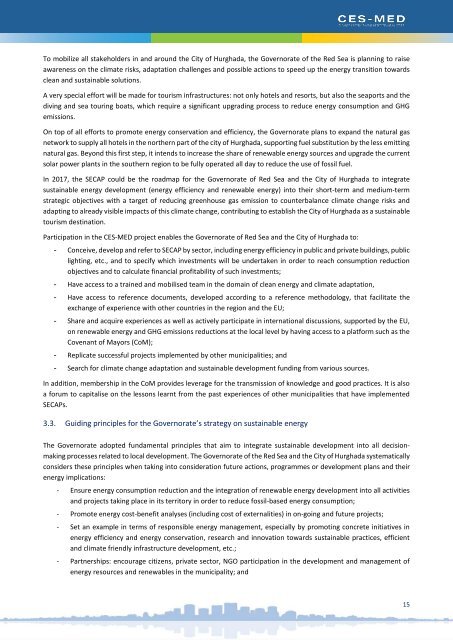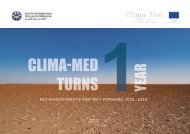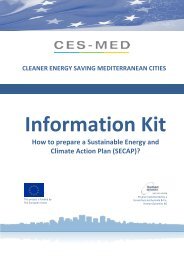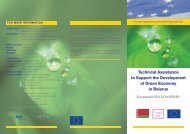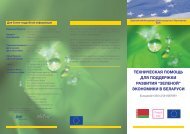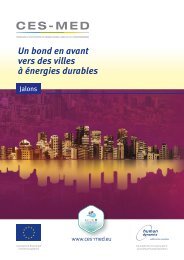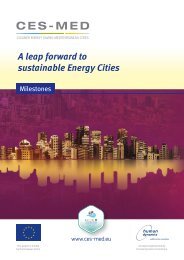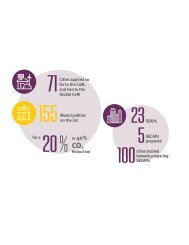020318_Hurghada SECAP_FINAL
You also want an ePaper? Increase the reach of your titles
YUMPU automatically turns print PDFs into web optimized ePapers that Google loves.
To mobilize all stakeholders in and around the City of <strong>Hurghada</strong>, the Governorate of the Red Sea is planning to raise<br />
awareness on the climate risks, adaptation challenges and possible actions to speed up the energy transition towards<br />
clean and sustainable solutions.<br />
A very special effort will be made for tourism infrastructures: not only hotels and resorts, but also the seaports and the<br />
diving and sea touring boats, which require a significant upgrading process to reduce energy consumption and GHG<br />
emissions.<br />
On top of all efforts to promote energy conservation and efficiency, the Governorate plans to expand the natural gas<br />
network to supply all hotels in the northern part of the city of <strong>Hurghada</strong>, supporting fuel substitution by the less emitting<br />
natural gas. Beyond this first step, it intends to increase the share of renewable energy sources and upgrade the current<br />
solar power plants in the southern region to be fully operated all day to reduce the use of fossil fuel.<br />
In 2017, the <strong>SECAP</strong> could be the roadmap for the Governorate of Red Sea and the City of <strong>Hurghada</strong> to integrate<br />
sustainable energy development (energy efficiency and renewable energy) into their short-term and medium-term<br />
strategic objectives with a target of reducing greenhouse gas emission to counterbalance climate change risks and<br />
adapting to already visible impacts of this climate change, contributing to establish the City of <strong>Hurghada</strong> as a sustainable<br />
tourism destination.<br />
Participation in the CES-MED project enables the Governorate of Red Sea and the City of <strong>Hurghada</strong> to:<br />
- Conceive, develop and refer to <strong>SECAP</strong> by sector, including energy efficiency in public and private buildings, public<br />
lighting, etc., and to specify which investments will be undertaken in order to reach consumption reduction<br />
objectives and to calculate financial profitability of such investments;<br />
- Have access to a trained and mobilised team in the domain of clean energy and climate adaptation,<br />
- Have access to reference documents, developed according to a reference methodology, that facilitate the<br />
exchange of experience with other countries in the region and the EU;<br />
- Share and acquire experiences as well as actively participate in international discussions, supported by the EU,<br />
on renewable energy and GHG emissions reductions at the local level by having access to a platform such as the<br />
Covenant of Mayors (CoM);<br />
- Replicate successful projects implemented by other municipalities; and<br />
- Search for climate change adaptation and sustainable development funding from various sources.<br />
In addition, membership in the CoM provides leverage for the transmission of knowledge and good practices. It is also<br />
a forum to capitalise on the lessons learnt from the past experiences of other municipalities that have implemented<br />
<strong>SECAP</strong>s.<br />
3.3. Guiding principles for the Governorate’s strategy on sustainable energy<br />
The Governorate adopted fundamental principles that aim to integrate sustainable development into all decisionmaking<br />
processes related to local development. The Governorate of the Red Sea and the City of <strong>Hurghada</strong> systematically<br />
considers these principles when taking into consideration future actions, programmes or development plans and their<br />
energy implications:<br />
- Ensure energy consumption reduction and the integration of renewable energy development into all activities<br />
and projects taking place in its territory in order to reduce fossil-based energy consumption;<br />
- Promote energy cost-benefit analyses (including cost of externalities) in on-going and future projects;<br />
- Set an example in terms of responsible energy management, especially by promoting concrete initiatives in<br />
energy efficiency and energy conservation, research and innovation towards sustainable practices, efficient<br />
and climate friendly infrastructure development, etc.;<br />
- Partnerships: encourage citizens, private sector, NGO participation in the development and management of<br />
energy resources and renewables in the municipality; and<br />
15


